#books about music
Explore tagged Tumblr posts
Text
Are you ready to rock!? Get ready for the WHYTE PYTHON WORLD TOUR!!! 🤘🎸
But beware... this isn’t your typical 1980s hair metal concert: With the Cold War breathing its last gasps, the band is unknowingly playing host to the final battle for the hearts and minds of the Eastern Bloc, and the stakes for his mission—to spread peace, love, and epic shredding across the globe—are dangerous.
Drummer Rikki Thunder narrates this raucously funny debut, steeped in ’80s music culture nostalgia and international suspense.
Available for pre-order now: https://www.penguinrandomhouse.com/books/773225/the-whyte-python-world-tour-by-travis-kennedy/
69 notes
·
View notes
Text

The local bookstore has a few bookclubs and author readings. I've thought about going to these for a couple years now, but never did. There's a sci-fi book club, and another one for international books translated into English. Both of those appeal to me. But the sci-fi books have all been apocalyptic or post-apocalyptic, and I'm just not in the headspace for that. Too much of that shit in the news. I read one of the international books, and it was very good, but I didn't finish it in time for the club.
So, when I saw an author reading for a book about the persistence of old pop music and the struggle for new music to get heard, and the reading was a couple weeks out, I thought, here's a good chance.
The blurb for this book misrepresents what it's really about, IMO. Here it is.
"A veteran music journalist argues that the rise of music streaming and the consolidation of digital platforms is decimating the musical landscape, with dire consequences for the future of our culture …
In The Endless Refrain, former Washington Post writer and editor David Rowell lays out how commercial and cultural forces have laid waste to the cultural ecosystems that have produced decades of great American music. From the scorched-earth demonetizing of artist revenue accomplished by Spotify and its ilk to the rise of dead artists “touring” via hologram, Rowell examines how a perfect storm of conditions have drained our shared musical landscape of vitality.
Combining personal memoir, intimate on-the-ground reporting, industry research, and cultural criticism, Rowell’s book is a powerful indictment of a music culture gone awry, driven by conformity and subverted by the ways the internet and media influence what we listen to and how we listen to it."
Reading that, I assumed that the book would be about music streaming, digital platforms, demonetization, the internet and media influence, and how those things cause old songs to dominate a lot of spaces, while musicians making new music try to work those systems as best they can. I don't think that's an unreasonable expectation.
The book is about the "endless refrain" of old music. It begins with some anecdotes about hearing old pop and rock songs in movies, commercials, in the background of stores, etc. The author tells us about the two McDonald's restaurants near his house: one only plays music from the 1970s, the other one plays hits from the '80s. There are also stories of how he heard music growing up, and how not only his generation, but younger ones hold on to that music.
The rest of the book is divided into two sections. The first is about cover bands. The author interviews several of them over a decent period of time, talking to them about how they got into music, describing their gigs, and asking them why this music remains so popular. He also talks to a few audience members attending the shows. To his (and my) consternation, some fans who weren't even born when this music was made only want to hear the stuff they grew up hearing on their parents' stereo, and see no value in new music. The second section is about hologram concerts. He talks to people who run these companies, how it works, some of the things it can do that a cover band can't, and again, why old music remains so prominent.
The industry forces, the streaming models, the commodification of music catalogs, the homogenization of radio, all the things that are in the blurb, are barely touched. When these topics are touched upon, it's in the context of an interview. They come up in conversation, not as the focus. They are discussed in detail, explained, or broken down as the blurb implies.
The interviews are good. The world of cover bands was not something that I knew much about. I had no idea they had become such a big deal in live music. Some of these people do have interesting, compelling stores. But that's not what the back cover sold me, and it's not what I was looking for.
That was disappointing, because the story of how the music industry devolved from a scam that enriched executives while underpaying artists into a scam where tech companies treat songs like memes and pay artists even less is an interesting one. It illustrates how broken our system is for most of us, and how we get duped into thinking that a shittier but "more convenient" version of a product is some kind of progress. The way that radio conglomerates (effective monopolies in many markets) treat music like stock investments -- maximize return and minimize risk -- and how streaming services turned most music into the equivalent of penny stocks is a subject that could occupy a whole book, or at least part of this one.
(The blurb does not promise this, but there's also a lot to say about why music fans turned so quickly and so hard on the old model: because we knew they were cheating us, so we leapt at the opportunity to steal via Napster, because fuck them, even huge artists only made money by touring, not from gold records. Eighteen bucks for a CD in 1995? Kiss my ass.)
but what confused me was, if the author is concerned about the difficulty of new music getting heard, why did he spend the whole book focusing on two parts of the entertainment world that have no interest in new music? I think the reason is that, doing so provides evidence for just how popular these old songs are (so many Journey cover bands), and how they can continue to be adapted into new forms (holograms). The section about cover bands really drives home that a significant portion of the audience for live music loves this stuff, and some of them don't want anything else.
But surely that's just the opening portion of the discussion? Having established that the "I Want My MTV" era of pop and rock songs is still hanging on to more than its fair share of the national ear space, shouldn't you then show where and how new music is getting heard? There are some nods to the giant pop idols of the now like Taylor Swift, but that's it.
That was frustrating to me, because I'm not much younger than the author, but I see new music online every day. I also remember when MTV started, and when the radio was full of exciting new music. Growing up, there were multiple record shops even in my modestly sized home town. (RIP Hot Dogs records and tapes.) Those outlets have been effectively dead for decades now. Yeah, radio and MTV are still around, but jokes about Music Television not playing music are at least twenty years old now, and radio adopted the "twenty songs on eternal rotation" model in the late 1990s. However, there's lots of new stuff posted to YouTube daily. Then there's Bandcamp, which has a dizzying array of new music, and it actually offers a good deal to the artists. I constantly have more albums in my Bandcamp wishlist than I can afford to buy. I have to cull it every few months so it doesn't become unmanageable.
Cover bands are big in some circles, but what about music festivals that showcase new music? There are a lot of them. This author is also from North Carolina, but do they not know about the Grass Roots fest at Shakori Hills? Or Merlefest? Pretty sure there was a big music fest in the Raleigh/Durham area in recent years. Cat's Cradle is still hosting new music in Carrboro, and the Haw River Ballroom has national acts coming through on the regular. Charlotte has clubs that host touring bands that play new stuff. I went to see Amon Amarth in Asheville this past spring, and yeah, they've been around for a minute, but they played stuff from the new album, and the crowd ate it up. Pick up a heavy metal mag, and every fifth page is an add for a metal festival. Subscribe to Dirty Hit's YouTube channel if you want to hear some catchy new pop music. Then check out WherePostRockDwells and get ready to be dumbfounded about how many bands are making new music in that genre. Ditto Chillhop, CryoChamber, etc. etc. Hell, Blue Note is putting out new stuff every week on YouTube even after all these years. It might not get played at McDonald's, but new music is out there. It's a shame this book didn't look into it.
0 notes
Text
this is just my opinion but i think any good media needs obsession behind it. it needs passion, the kind of passion that's no longer "gentle scented candle" and is now "oh shit the house caught on fire". it needs a creator that's biting the floorboards and gnawing the story off their skin. creators are supposed to be wild animals. they are supposed to want to tell a story with the ferocity of eating a good stone fruit while standing over the sink. the same protective, strange instinct as being 7 and making mud potions in pink teacups: you gotta get weird with it.
good media needs unhinged, googling-at-midnight kind of energy. it needs "what kind of seams are invented on this planet" energy and "im just gonna trust the audience to roll with me about this" energy. it needs one person (at least) screaming into the void with so much drive and energy that it forces the story to be real.
sometimes people are baffled when fanfic has some stunning jaw-dropping tattoo-it-on-you lines. and i'm like - well, i don't go here, but that makes sense to me. of fucking course people who have this amount of passion are going to create something good. they moved from a place of genuine love and enjoyment.
so yeah, duh! saturday cartoons have banger lines. random street art is sometimes the most precious heart-wrenching shit you've ever seen. someone singing on tiktok ends up creating your next favorite song. youtubers are giving us 5 hours of carefully researched content. all of this is the impossible equation to latestage capitalism. like, you can't force something to be good. AI cannot make it good. no amount of focus-group testing or market research. what makes a story worth listening to is that someone cares so much about telling it - through dance, art, music, whatever it takes - that they are just a little unhinged about it.
one time my friend told me he stayed up all night researching how many ways there are to peel an orange. he wrote me a poem that made me cry on public transportation. the love came through it like pith, you know? the words all came apart in my hands. it tasted like breakfast.
#warm up#writeblr#actually this is because again i don't go here#i don't read/write fanfic but i have nothing but respect for my troops#but i also have never played minecraft. im sorry. please ask me any question about pokemon tho i love that shit#anyway#out of some banal and thoughtless curiosity i watched the minecraft movie trailer#and again i know nothing about minecraft. i am aware im in an endangered population#but im watching this going: this is so fucking.... BAD#there is NO LOVE in it!#like if someone who has NO history in minecraft watches that and is like - ohhh this is soulless#WHO IS THE AUDIENCE????#ppl who love minecraft are gonna hate it!!!#at some point it's the ''mean girls musical movie'' problem --#some people will always hate the premise of what you're doing and some people will love it#make it for the ppl who love it#and usually that somewhat convinces the haters to like. chill enough to TRY it . bc it IS good#but when you try to make it for the haters..... nobody likes it. it doesn't have passion. energy. footwork#which is a small way of saying a big thing: if you love something. fucking make it and assume someone will love it too.#i love u . be brave . be bold. be in boston and come to my reading#where i wrote a really weird fucked up little book.#love u love u love u etc
12K notes
·
View notes
Text
“Thousands of women erupted into shrieks. I remembered Vavra telling me that incidents of shattered eardrums at the boys’ concerts were rising, prompting the entertainment company that managed them to recommend earplugs. But I saw none being worn by the fans around me. They were finally breathing the same air as the boys; now was not the time to be less of a body.”
-from Y/N by Esther Yi.
1 note
·
View note
Text
Top 5 books about music
Hello friends!! Welcome to Top 5 Tuesday!! This week’s topic is top 5 books about music!! According to the British Indian Ocean Territory’s National Holidays Calendar (I had no idea it was a BIO calendar when I did the prompts), 2 February is National Ukulele Day. So, because my brain melted when I did the prompts for this quarter and I needed some inspiration, we have been linking topics to��
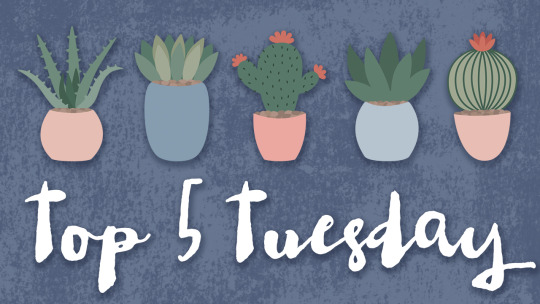
View On WordPress
#A Thousand Perfect Notes#Books#Books about music#C. G. Drews#Chris Russell#Daisy Jones and The Six#Jen Wilde#Music#Read#Songs About a Girl#Soul Music#Taylor Jenkins Reid#Terry Pratchett#The Brightsiders#Top 5 Tuesday
0 notes
Text
I think, perhaps one of the funniest things to come from EPIC popularising the Odyssey is that now a ton of people think Poseidon wanted to kill Odysseus.
In the Odyssey, Poseidon has no intention of killing Odysseus. In fact, part of the whole reason Zeus lets Poseidon do whatever he wants even though he thinks Odysseus is rad and should get to kiss his wife is explicitly because Poseidon had no intentions of killing Odysseus. Poseidon wanted to pay back the suffering/inconvenience blinding Polyphemus would have caused. It's a really abstract thing tbh. How do you pay back someone permanently disabling your son? Poseidon's solution was just to amputate Odysseus from his other half; i.e. Penelope. The end game was never murder, it was always an endurance race.
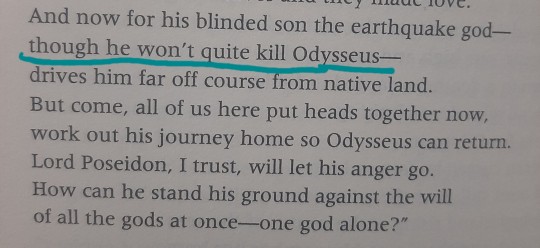
(Od. Book 1: Zeus reassuring Athena that he is not, in fact, a part of Odysseus Hater-Nation. Trans. Robert Fagles)
Also, for those wondering if there's any sort of in text reason for why Poseidon wasn't around in God Games - at the time in the Odyssey when Athena petitions Zeus to let Odysseus leave Calypso's island, Poseidon was -checks notes- on vacation in Ethiopia. Yep. He left to Ethiopia for a festival and thusly was very much absent for Athena's whole "please let Ody go? Please? 🥺" request.
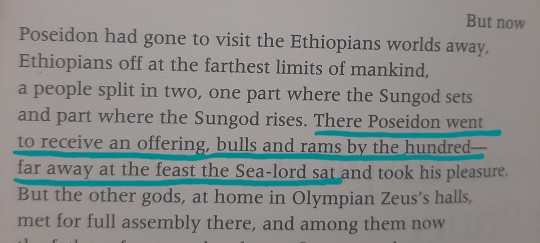
(Od. Book 1: While Odysseus was suffering, Poseidon went to party in the east)
I am begging y'all to read the Odyssey. It's a comedy for everyone except Odysseus and Penelope who are, in fact, suffering 24/7 365.
#ginger rambles#ginger chats about greek myths#Sorry for the quality of the quotes but I'm too tired to google a pdf vers of the Odyssey and then edit those so y'all are getting#my crunchy pictures from one of my physical copies of the book lol#it's reiterated multiple times that Poseidon doesn't want Odysseus dead too#he is literally just driving him mad on the ocean because that's what Odysseus condemned Polyphemus to by blinding him#Also there's no good way to mention this but the Odyssey starts#by Zeus lamenting how mortals blame all their troubles and miseries on the gods when that's just not fair#because the gods go out of their way to warn the mortals that will be saddled with the most wretched fates#and they ignore the gods and do whatever they want anyway LMFAO#It's a really smart way to tie in the whole Orestes plot that would have wrapped up in between Odysseus getting stranded on Ogygia#and Odysseus getting off of Ogygia#epic the musical#epic the wisdom saga#zeus#athena#odysseus#poseidon#the odyssey
4K notes
·
View notes
Text

"Oh wise Athena, help them see..."
#cassandra of troy#paris the musical#greek mythology#the iliad#tagamemnon#trojan war#homeric epics#artists on tumblr#fanart#<-i know she has like.. three lines in the iliad but SHES SPECIAL TO ME!!#her story is so tragic and she is honestly such an underrated character#(also that book about her by christa wolf is fire)#own post
2K notes
·
View notes
Text
Pledging My Time - A Review
Pledging My Time is a book by Ray Padgett published by EWP Press in 2023. It is a book of forty interviews with people who have been in Bob Dylan's band or, in some way or another, have been a musical collaborator.
Bob Dylan has a 60-year history of being one of, if not the most, influential and essential writer, performer, and musician of our modern times. The possibility for scholarship seems as never-ending as his legendary touring schedule. This book has a simple task - interview people who have played with Bob to see what that is like. It is so simple that it is hard to believe it hasn't been done before and, yet, I predict, this book will be quoted in scholarship about Dylan for decades to come.
What I like best about the book is the variety of people interviewed- from the performance artist responsible for the Soy Bomb incident to Jeff Bridges, from the early years to Rough and Rowdy Ways. I liked that the author included footnotes of clarification because no one has a perfect memory. I like that there were different versions of the same events. I like most that it was not about Dylan's personal life. We might hear that a leg of the tour was challenging because Dylan was having marital issues, but that does not elicit follow-up questions about the romantic drama as much as a follow-up about what it was like to play with Dylan while he was going through personal life stuff. I would have liked more in certain portions of Dylan's musical career. It left me wanting more.
So what are my five top takeaways?
Dylan is not as aloof as we have heard. There are stories in this book about performers who worked alongside Dylan for a tour without Dylan speaking much to them. There are many stories, though, about Dylan being shy and, yet, he goes to a rat pack concert, walks with a bandmate at night through the streets of cities, attends a baseball game, he plays cards on the tour bus. These are stories we don't typically hear which humanizes him in a nice way.
Dylan is highly respected and honored among almost all musicians who have played with him. Perhaps, this shouldn't be surprising, but stories of Tom Petty, who while touring with the Heartbreakers often skipped sound checks, coming to every sound check while touring with Dylan out of respect "in case" Dylan wanted to work something up with the band. The person who said that, with all the great musicians who dropped by to play, George Harrison was the only one who was of par. The stories of musicians who played alongside him for several concerts and suddenly found themselves in tears on stage realizing that they were playing with Dylan on THAT song. Those show the incredible talent and respect in which musicians hold him. People love him for his lyrics and his music and for his historical type of interest in music of all genres.
Dylan loves children. Again, perhaps this shouldn't be surprising. He is after all a father of six and a grandfather, but the stories of bandmates children having an interaction with Dylan is priceless. One person indicated that Dylan seems to like kids because they don't know he's famous and are not in awe of him.
Dylan is an athletic type of guy. I knew he was a boxer, but there are not many stories of boxing. There are biking around Europe, going to the batting cages, and swimming at the Y in different towns. How does a man with a grueling tour schedule keep going into his eighties? Incorporating physical activities in the routine of touring has, perhaps, helped over the years.
Dylan approach to music is kind of like jazz, many band members said. It was a challenge to play with him because no song is sung or played the same. Some band members thrived with this approach and some did not, but several commented on it. He is clearly in charge of the direction he wants his music to go and what worked great on one leg of the tour might not be where he wants to go on the next. Many musicians spoke about keeping a strict eye on him the whole time and described a certain movement in his leg or his shoulder to know he was appreciating their playing.
The book has already enhanced my enjoyment of his playing. I watched a video the other day of Tom Petty and Bob Dylan singing into the same microphone and remembered the musician from the Heartbreakers who talked about the intimacy of that - that they are smelling each other's breath in that moment. I had never considered why they made that decision or how it might impact their ability to play together - like brothers - like a tri
I recommend the book and look forward to a second volume if one is released.
1 note
·
View note
Text
Love seeing the new generation find out how, well, gay "Wicked" is.
Closeted high femme dressed as the lesbian flag not getting on her rebellious activist bestie's broom and regretting it for the rest of her conformist life.
#wicked#gelphie#tbf the books are much gayer bc everyone there is bi by default. some interpret book elphaba as intersex. her son is bi and has both a male#lover and a female one. elphie kisses glinda before they part and it's not clear whether or not they had sex when they slept together#in the same bed.#but anyway at least this film added some side gay characters swooning over fiyero <3#crope and tibbett my beloved side flamboyant gays that were removed from the musical. jail for musical! for that and for#the forced love triangle. book glinda never had a thing with fiyero--although tbf even in the musical that comes off as#somewhat performative on glinda's part bc she cares about her image and fiyero is the perfect guy for that
2K notes
·
View notes
Text
"The Cello Still Sings" by Janet Horvath
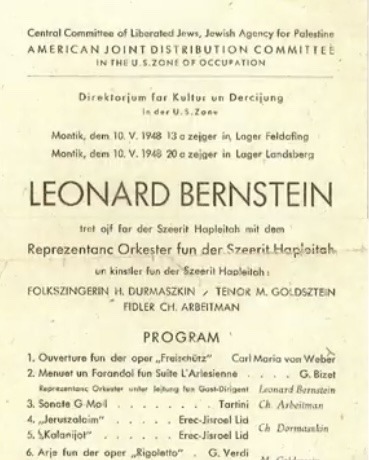
View On WordPress
#books about music#Canada#Canadian#cello#classical music#Janet Horvath#music#music discussion#Music Education#music history#music of our youth#musician#The Cello Still Sings#Women in Music
1 note
·
View note
Text
Book of the Week: Reach for the Stars
A non-fiction pick today, just to make a change… I was very much buying pop music through a lot of this era, so it was fascinating to read the story behind the music, as told by (most of) the people who were there. The majority of this book takes the form of quotes from the people involved – with comments and context from the author inserted where necessary. Michael Cragg is a music writer, who…
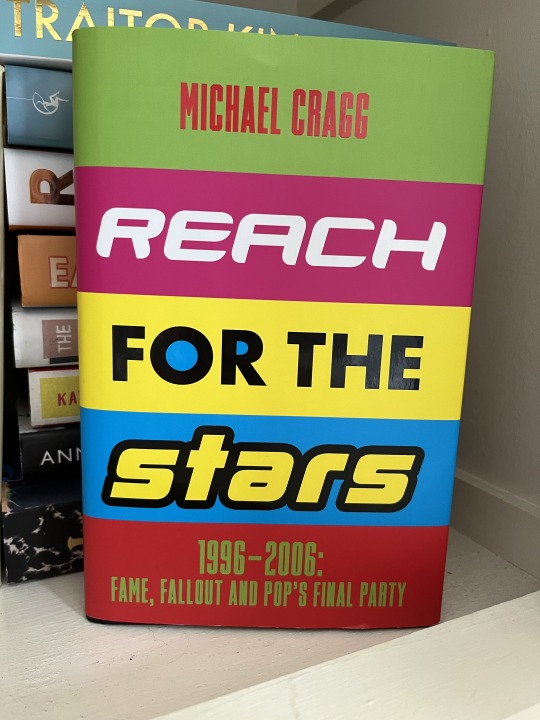
View On WordPress
#Book of the Week#book reviews#books#books about music#music books#New books#non-fiction#pop culture
0 notes
Text
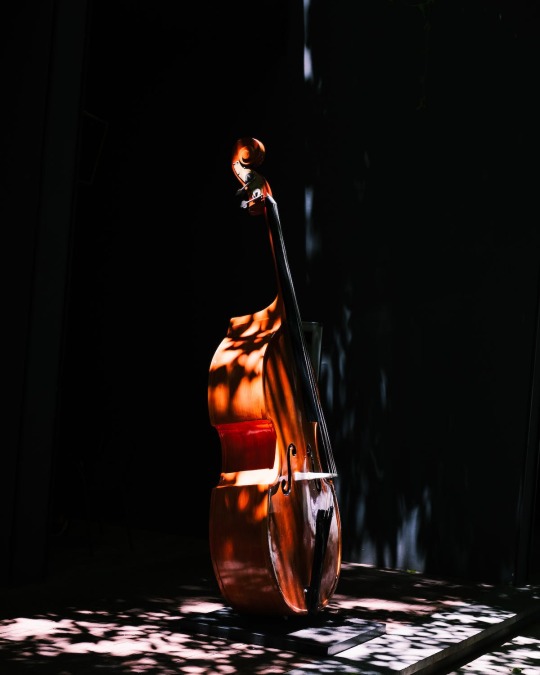
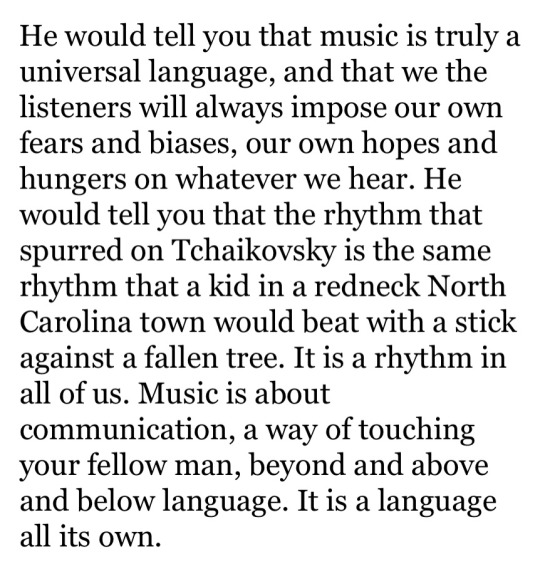
The Violin Conspiracy by Brendan Slocumb
#books#literature#book recommendations#quotes#literature quotes#black authors#books about music#violin#novels#reading#reading recommendations#contemporary fiction#fiction#music#booklr#book quotes
1 note
·
View note
Text
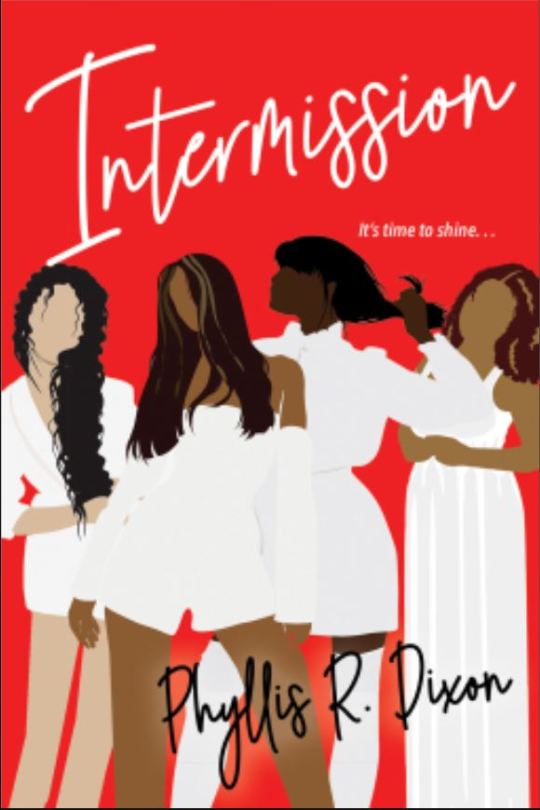
by: Phyllis Dixon Published: Jul 25, 2023 Genre: Contemporary, Adult, Fiction 320 Pages, E-Book Courtesy of NetGalley
★★
GoodReads Synopsis:
An insightful and dramatic novel of women’s friendship, feuds, and fame as a 1990s pop music group, reminiscent of Destiny’s Child, reunites for a second shot at mega-success and must deal with both the new demands of today’s social media and the same old traps of yesterday. Perfect for fans of Terry McMillan and Sheila Williams.
Angel. Carmen. Doreen. Jade. Talented Memphis girls who had a brush with pop music fame—guided by Carmen's warm-hearted mother. But when she was elbowed out for a bigger manager, Carmen walked too. The bitter breakup shattered the Diamonds' never-easy “sisterhood” —and cost them the big-time Now a reunion offers a fresh start, just as mid-life struggles are pushing all four to the brink.
My Review:
This was a quick and easy read but, the story itself was very predictable and underwhelming.
The story of The Diamonds is told through the point of view of each member, with two (maybe 3) chapters told by them as a group. Jade, Carmen, Doreen, Angel, and Ms. Gloria really give you Xscape, plus Mama Joyce or, Destiny's Child, plus Ms. Tina.
One of my biggest issues with the story is, how quickly the pacing of the chapters - it all seemed rushed and I had no concept of the timing of the story. From what seems like just a few days is really months. There is a car accident and then a few chapters later, it has been a whole year. It feels like so much was put into each storyline but, nothing was really fleshed out. The characters have no substance.
Carmen spends most of the story making rash and immature decisions without thinking of the long-term (or even short-term) implications of her actions. Most of her behavior is not the way I would envision a 40-something-year-old woman.
Doreen has a sordid past with her husband and to their credit, turned their lives around. However, for most of the story her husband, James is selfish, controlling, unhelpful, and rude! I hated that for Doreen and wanted her to stand up for herself.
Jade, oh Jade. Naive as they can be but also, with a husband who is literal trash. Her personal story and journey were much more confusing to me. Again, the pacing just didn't allow for her to be fully fleshed out.
Angela (Angel) is BIG "I just want to be solo" vibes. While she does have some redeeming qualities, it comes late in the story. From the jump, she rubbed me the wrong way.
Another issue is, when we jump to the present-day Diamonds, what year is the present day? The prologue says that the original group got together in 1991, then six years later they were stars and preparing to tour internationally when Carmen quits, this would be 1997. Then 20 years later is 2017 and the story runs for a little over a year, let's say 2 (I think). By my math, if its 2019 and Doreen is 40, then in 1991, she would have been 12! Something about the timeline is throwing me off.
Final thoughts: It reads like a Tyler Perry play or film. Lots of emphasis on God even when it's borderline ridiculous. "God is the best lawyer. We just need to pray," that is a direct quote.
One-Word Summary: Laughable
#Intermission#Phyllis Dixon#books about black women#books i read#tbr 2023#fiction books#books about music#contemporary books#young women books#2 star reads
0 notes
Text
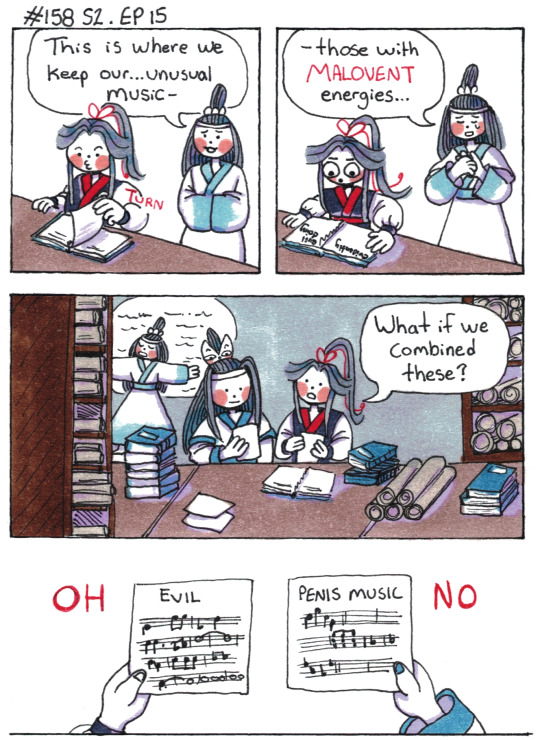
The penisest of tunes.
[First] Prev <–-> Next
#poorly drawn mdzs#mdzs#wei wuxian#lan wangji#lan xichen#When I was listening to this episode I was truly losing my mind when Lan Xichen was giving the pre-amble.#'This is where we keep our unusual music' and 'music with malevent energy.'#If that isn't penis music...I don't know what is. I feel like my goofs have been justified.#I love how JGY's craftiness comes into play here. Of *course* he knows about the secret library - he was a spy for a reason!#His secret skill is finding secret spots!#Like how your cat gets into spots you did not intend for them to get into.#So sad Lan Xichen didn't show JGY the library. I can't say something silly like 'haha secret lan makeout library'#...FOR THEM. This 100% was and continues to be the secret lan makeout chambers. Generations of secret kisses happened in there.#The things those scrolls and books have seen...#Next comic is a bigger one than usual! I might take a short break to get it done so it sticks the landing.#It's House of Gentians time!
2K notes
·
View notes
Text

[…]


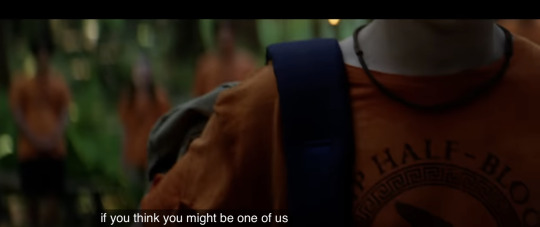

Percy’s warning to fellow half-bloods in the audience, across different mediums.
The Lightning Thief by Rick Riordan (2005) The Lighting Thief: The Percy Jackson Musical (2017) Percy Jackson and the Olympians Series Teaser (2023)
#I have been thinking about making this for SO long#but this semester sucked#anyway I love it when adaptations play to their strengths and make changes to fit the medium#and these little differences tingle my brain a little bit#I didn’t want to check if the movies had something similar because I am Tired and the show and movie version would be pretty similar#anyway#the musical line always gets me#‘better get headed to the exits now’ is such a good adaptation of the ‘close this book idea’#and I know I could’ve just done one of the excerpts from the book but I like both#and I didn’t want to have the paragraph in between to make it just like. a block of text.#percy jackson#pjo#pjo disney+#pjo Disney#walker scobell#pjo show#percy jackon and the olympians#web weaving#riordanverse
3K notes
·
View notes